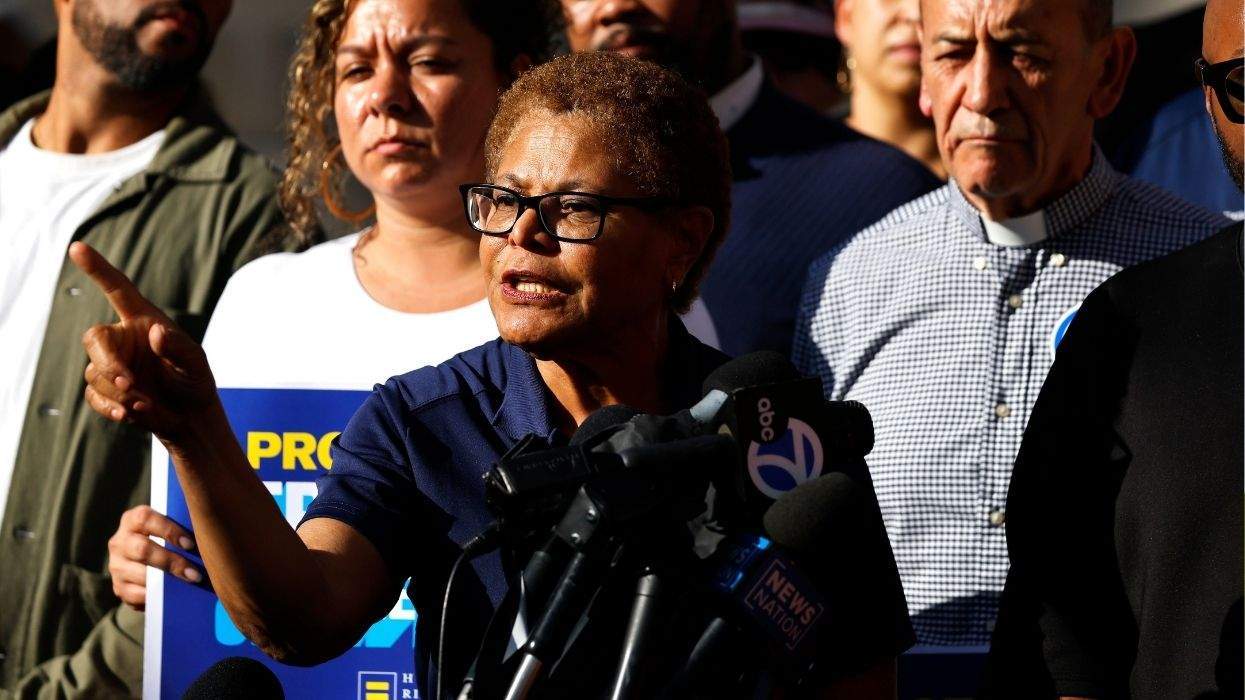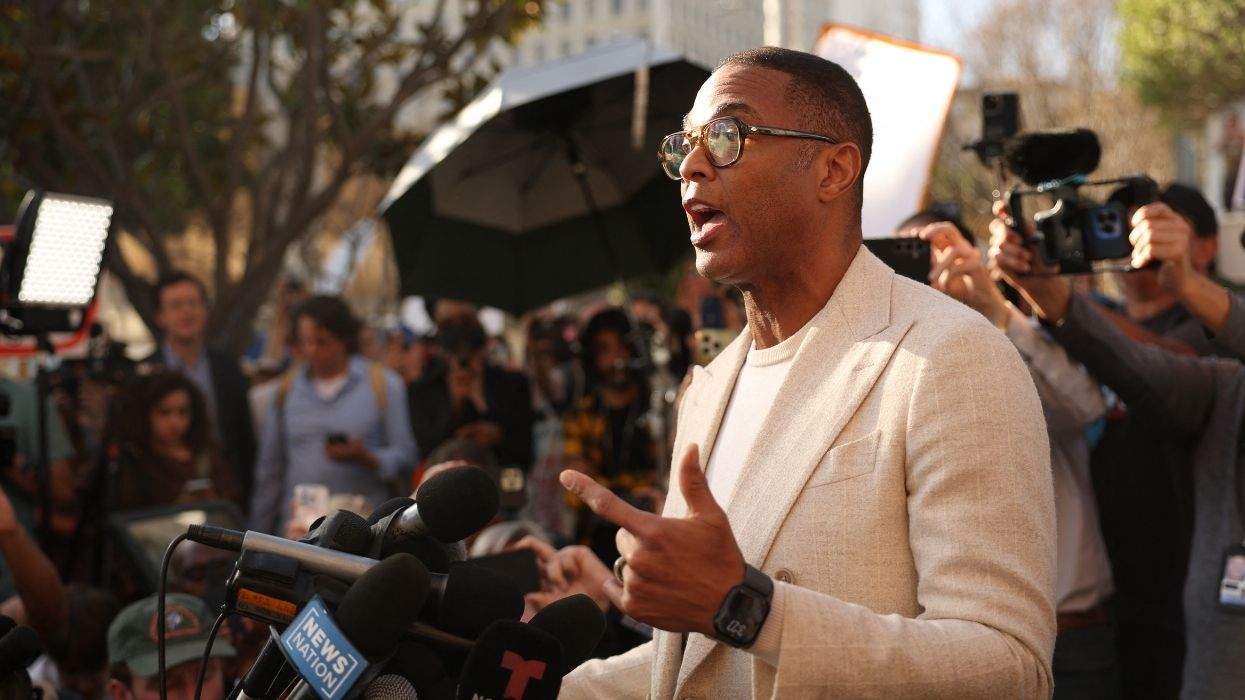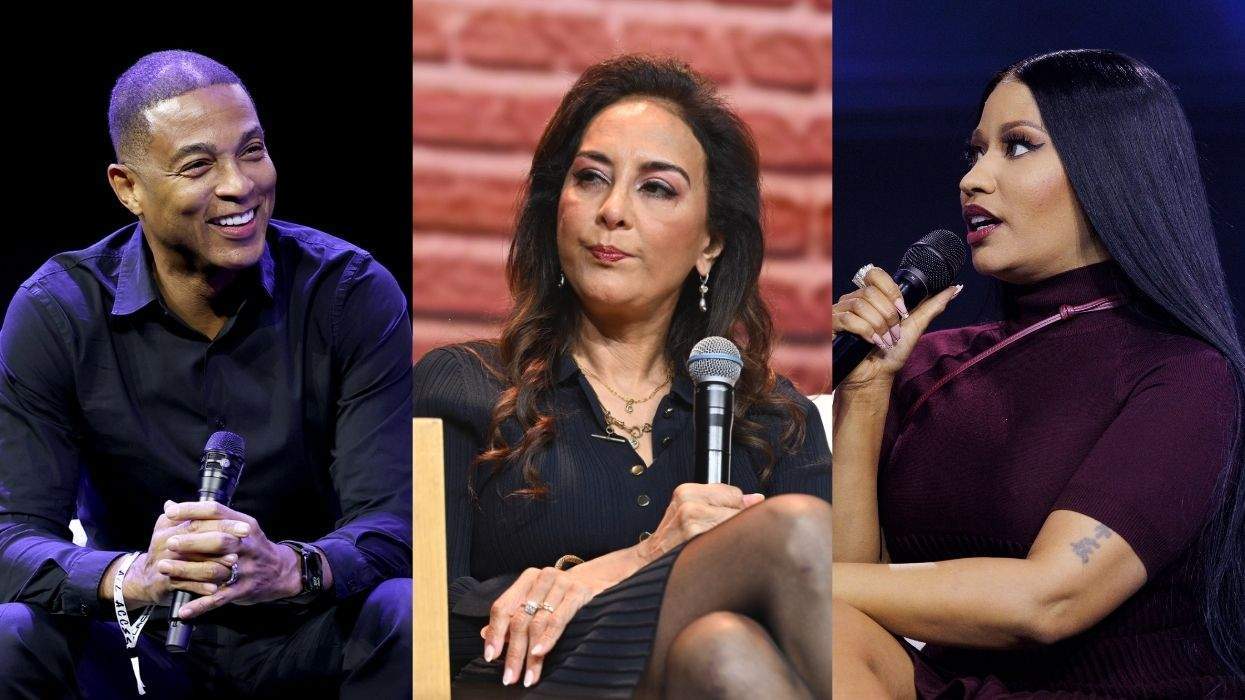On the day Thomas Roberts turned 27, he sat down with his mother at her kitchen table, and broke down in tears.
"What's wrong?" asked his worried mother, Michelle Roberts. Despite a successful career as a reporter on television, he just couldn't get the words out. All he could do is weep.
"All right, I'll guess," she offered. "You murdered someone?"
Roberts shook his head no.
She tried again. "You got a woman pregnant?"
Roberts managed to utter the word "No."
"You're gay?" she asked.
Roberts looked into his mother's eyes and answered.
"Yes!"
Michelle Roberts didn't hesitate to hug her son. And as they both cried, her first words to him were not to question him, to offer some maternal advice, or even to tell him what he already knew, that she loved him. She instead said, "I'm sorry you have been dealing with this all alone for so long!"
"That special moment," Thomas Roberts tells The Advocate, "her way of figuring out what I wanted to say but couldn't, her way of telling me, 'This is OK, we can do this' -- that gave me the confidence I needed to carry on."
And so he has. The Comcast/NBC cable network is doubling down on its most prominent gay male anchor. Roberts debuted Monday as the sole anchor of a new two-hour newscast: MSNBC Live with Thomas Roberts. Roberts is 42, married two and a half years, and has been with the channel, known for both news and talk shows, since 2010.
The network moved Roberts to this new time slot to replace two shows that were drawing abysmal ratings, Ronan Farrow Daily and The Reid Report. Roberts said his new program comes at "a time of rebirth" for MSNBC.
Executive producer Omnika Thompson, who has previously worked with Roberts, tells The Advocate the network's goal is to bring viewers a substantial selection of breaking news, pop culture, and social interaction, plus lots of Roberts, from 1 p.m. to 3 p.m. Eastern.
"This is the sweet spot," Roberts says. "Early afternoon on the East Coast, late morning on the West Coast, in between Today and Nightly News, where we'll cover whatever develops. Our viewers will feel a lot smarter after getting a diet of information."
That diet will be assembled daily by Thompson, Roberts, and a team of producers and correspondents, including Frances Rivera in the role of social media maven. In addition, Roberts says, the program will rely on MSNBC's "Bridge," a new team of researchers, contributors, and news gatherers including Pulitzer Prize-winner Trymaine Lee, to find stories, topics, and people in the news. This show seems to be the thing that Roberts has been gunning for throughout his career.
"I spent half my life, 21 years, working in local markets, cable, syndication, and network to get to this moment," Roberts says in reflection. "I endured the witness protection program of TV news," he notes, chuckling at what he also calls his "love affair of moving," as he traces his career path: from growing up in suburban Baltimore to his first job at age 23 in San Diego -- he proudly shows off the KNSD TV leather-bound binder he cherishes as a keepsake -- to his first reporting gig in Lincoln, Neb., where he learned to love the Huskers. He took an investigative reporter job in Fort Myers, Fla. -- "Having doors slammed in my face, I loved that!" -- and then made his last stop in local news, WAVY TV in Norfolk, Va.
After coming out to his family and his close friends -- what Roberts calls "being fully integrated" -- he says he found he had "so many knots to untie. I needed to calculate risk," in terms of coming out to coworkers and, given the job climate in 2000, to be careful to not make waves or be seen as a liability instead of an asset.
"I was careful not to cross streams," says Roberts, citing Ghostbusters, in his efforts to keep his private life private, and to keep his job.
So one night 15 years ago, when gay friends invited him out to a party, Roberts was hesitant. "'But it's in North Carolina,' they told me. 'No one will know you in North Carolina.'"
Roberts relented and joined his buddies at a going-away party for someone he'd meet for the first time. It turned out to be the man with whom he'd fall in love.
Thomas dated Patrick Abner long-distance for five years. Whether it was a one-hour flight or a five-hour drive, the 273 miles between Norfolk and Philadelphia could not keep them apart. But when Roberts was offered his dream job to report in Philly so he could be closer to Abner, fate stepped in: CNN wanted him too.
His agent told Roberts, "You cannot turn this down." And he didn't; Abner moved with him to Atlanta.
And it was while he was working at CNN that Roberts made the decision to come out publicly, a move he says was questioned by the honchos running the network.
"They saw the potential obstacles, and I did too," he says. "I felt like the world would stop if I came out." But in 2006, Roberts delivered a speech to the National Lesbian and Gay Journalists Association in which he announced he is gay.
"Being gay is a blessing," Roberts tells The Advocate. "Coming out was not easy. It was a ring of fire. And we can be our own worst enemy. But I'm happy with who I am, being married to a wonderful husband."
It was a struggle, as Abner's career took them to Washington, D.C., in 2007, where Roberts was unable to find work with CNN or anyone else. Abner told The New York Times, "I would say that was the roughest time. There was definitely a point where both of us thought maybe it would be easier to go our separate ways. But as I thought about that it made me sick. Letting Thomas go was not an option."
A job for Roberts at a syndicated Hollywood entertainment show split them apart once more, and after six months, Abner joined him in Los Angeles, just in time for Roberts to be fired for the first time in his life.
"It was a good learning experience," Roberts says. "A lesson in value and opportunity, and a downer. Some things just don't work out."
But by this point their relationship was battle-tested. Roberts and Abner will celebrate 15 years together in September, three as a married couple.
"We are so simple, and I hate to use the phrase but we're boring. I'll get home from work, Patrick will have dinner ready, I'll change into elastic pants and we'll fight over the Ben & Jerry's Karamel Sutra, which I insist is a single serving. We'll catch up on our day and -- in between phone calls with Omnika -- catch up on our shows on the DVR."
And what is it Abner and Roberts are watching? He hesitates, then blurts out, "OK, it's Real Housewives of Beverly Hills."
Roberts is charming as he shows off photographs of his parents and family. "Like everybody else, I'm able to put my wedding photo on my desk, to complain with Omnika about our husbands, without fear," he says (though Thompson does interject that she has no complaints about her husband).
Having avoided the possibility of being outed, Roberts says he believes news anchors and reporters need to come out in their own time and "it's not our job" to out anyone, and "they deserve our compassion." But he does offer what he feels is a bigger problem than closeted news anchors: "Our elected congressional and state leaders in control of legislation that hurts LGBT people -- that's hypocrisy."
As to the accusation that the anchor overshares on social media, Roberts dismisses it easily. "That is silly," he says. "Taking pictures of mine and drawing a conclusion about me is to take them out of context." Roberts, his husband, and their two dogs have many followers who are not complaining about their seemingly unlimited access to his offstage life.
"My right to live my life is mine. And I'm not afraid to tell people that," he says. But can Roberts be gay and cover LGBT issues such as the marriage equality battle fairly and objectively? He and Thompson say their show is not an opinion program. "It's not a POV product," Roberts cautions, but he isn't shy about his view on the "threat" of same-sex marriage to so-called traditional marriage.
"I know what the biggest threat is to marriage: It's divorce. Let's put divorce on the ballot and watch as people lose their minds," he says. "All marriage equality is doing is redefining what marriage means. And the word to define how it's doing is success. We still have a ways to go, and we need to get the Employment Non-Discrimination Act passed. Before someone can say we don't need these rights, they need to walk a mile in my shoes."
Roberts will continue to anchor Out There, a one-hour weekly program on MSNBC Shift that focuses on LGBT issues and is streamed online. "It's an area I have passion to cover what's trending and not getting coverage elsewhere, in five- to seven-minute segments," he says. "And what's important to me is to always have a straight ally as a guest, and ask them why they are supportive, what it means to be an ally. That way all voices are represented."
He names as his inspiration activist David Mixner, the late ABC anchor Peter Jennings, and cautioning, "This is where I get really gay: Lynda Carter and Judith Light."
Roberts does not name Brian Williams, currently suspended from NBC because of an exaggerated tale of bravado during the Iraq war. He does say he "100 percent supports the network and Brian's decision," and when asked if he's being groomed for the Nightly News anchor chair, currently filled by Lester Holt, Roberts smiles and says, "They haven't called yet. It would be historic, and I am willing and able. But right now I'm focused on this. I'm working in the land of opportunity."















Charlie Kirk DID say stoning gay people was the 'perfect law' — and these other heinous quotes
These are some of his worst comments about LGBTQ+ people made by Charlie Kirk.